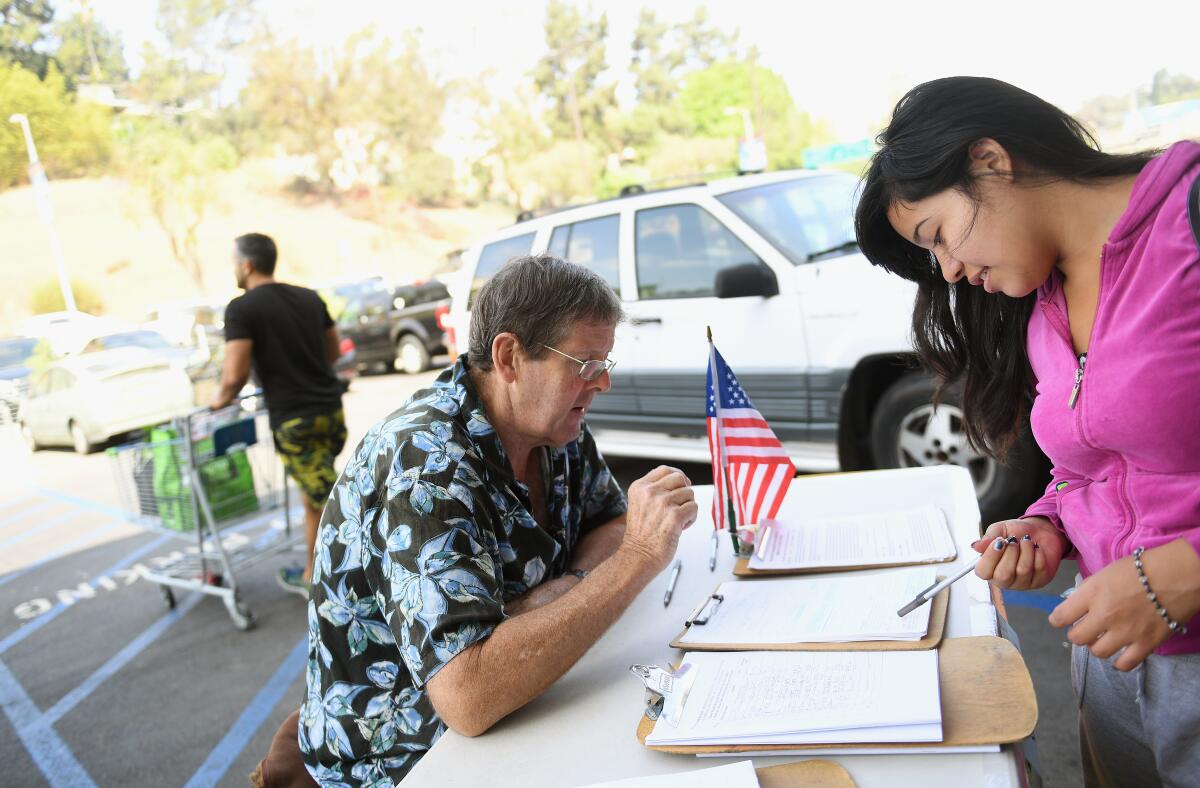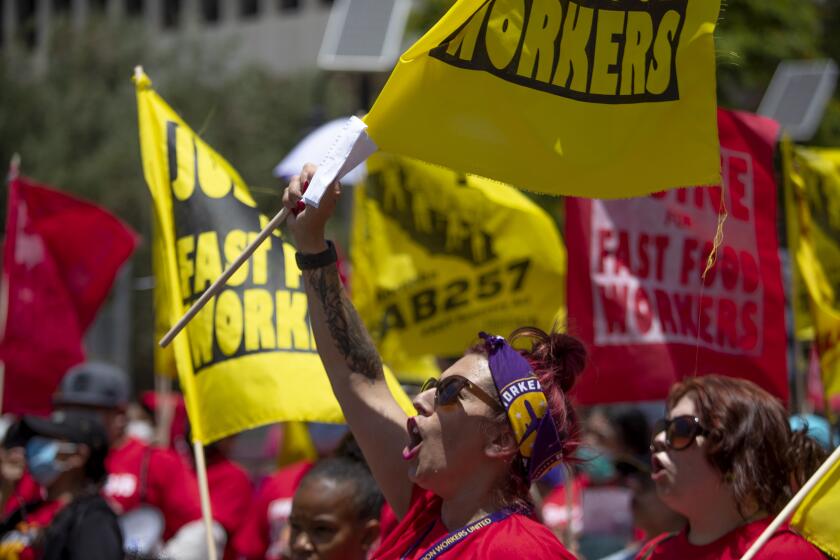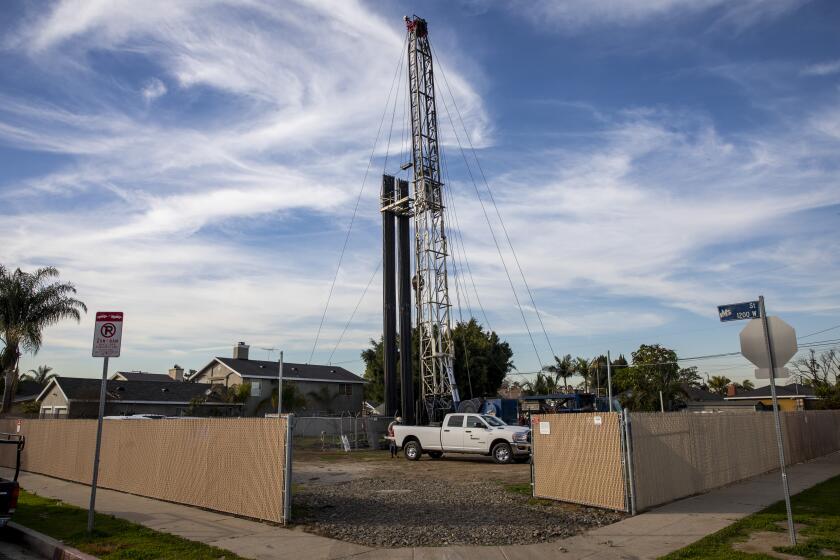Editorial: Careful what you sign. Petitions aren’t always what they seem

A few words of caution to any Californian approached by someone asking for your signature on a petition: Read carefully before you sign.
Most of the clipboard-wielding people you encounter outside grocery stores and shopping centers are not volunteers trying to change a policy because they deeply believe in the cause. They are workers who are paid for each signature they gather. And they might be misleading you about the petition they want you to sign.
Reports popping up around the state allege troubling instances of signature gatherers giving false or misleading descriptions to persuade people to sign petitions seeking to overturn two good laws Gov. Gavin Newsom recently signed. One petition is sponsored by the fast-food industry to overturn a law to set a higher minimum wage for fast-food workers. The other is sponsored by fossil fuel companies to overturn a law banning new oil and gas wells within 3,200 feet of homes and schools.
A complaint the Service Employees International Union filed with the attorney general about the fast-food campaign says that a signature gatherer in Los Angeles repeatedly told people they were signing a petition “for the minimum wage to go up” — even though, in reality, the petition seeks to overturn a new law that could result in higher wages for fast-food workers. Another signature gatherer in Stockton claimed the petition would “raise the minimum wage for fast food workers to 22 bucks an hour,” the complaint says.
That’s the opposite of the intent of the petitions, which are part of a campaign paid for by the fast-food industry to repeal a law Newsom signed last month that creates a statewide council made up of workers and franchise owners to set minimum wages at chain restaurants that could go as high as $22 an hour.
Gov. Newsom should sign a bill making California the first state with a system for fast-food workers to push for better pay and working conditions.
Fast-food restaurants, led by Chipotle, In-N-Out Burger, Starbucks and Chick-fil-A, have pumped $20 million into the effort to gather at least 623,000 signatures. If they’re successful, the law could not take effect until voters decide in 2024 if they want to uphold it.
Fossil fuel companies have put $9 million into a drive for signatures to repeal the oil and gas well ban. And their petition circulators are also stretching the truth, according to accounts shared on social media and with the press. A Times editorial board member encountered a man gathering signatures for that petition in Silver Lake with a sign reading, “Lower gas price$.” When asked if the petition was to repeal the ban on oil drilling near houses and schools, he said “no.”
The oil industry wants to put a referendum on the ballot to overturn California’s ban on neighborhood drilling. Californians shouldn’t fall for it.
State law makes it a misdemeanor to misrepresent the contents of a petition, but lackadaisical enforcement, a web of subcontracted services and ongoing demand from big-money campaigns have allowed some signature gatherers to act with impunity. The San Francisco Chronicle reported earlier this year that a man accused of misleading tactics in multiple states — who also was convicted of falsifying his own voter registration in California — runs a company that deploys petition circulators around California and “touts his company’s reputation for collecting large numbers of signatures quickly.”
California lawmakers have repeatedly passed bills to ban the practice of paying people per signature gathered, saying it incentivizes deception. But the legislation was vetoed by Newsom and former Gov. Jerry Brown.
“Payment per signature remains one of the most economical methods to qualify for the ballot. This measure could therefore make the qualification of many initiatives cost-prohibitive for all but the wealthiest interests,” Newsom wrote in a veto message.
The onus is on voters to make sure they understand a petition before deciding to sign. Here are a couple of tips:
- Read the “Title and summary” of the measure that must be printed on the top of the petition. It’s the official description explaining the proposed law, and it’s just a few sentences long.
- Ask to see the “Official Top Funders” disclosure. This information shows which interest groups or individuals are paying for the campaign and, by law, must be made available to anyone being asked to sign a petition.
- Voters who change their mind about a proposal after signing a petition can have their signature removed. Contact your county elections office for details about how to do that.
Your signature is valuable, as evidenced by the fact that corporations are spending millions of dollars to collect it. Enough signatures on a referendum petition will force a good law to be delayed, and could lead to it being overturned by the voters in an expensive ballot campaign. So when deciding whether to put your name on a petition, it’s best not to rely on the words of the person who passes you the pen.
What’s the most outrageous thing you’ve heard from someone gathering signatures? Share your stories with us at letters@latimes.com.
More to Read
A cure for the common opinion
Get thought-provoking perspectives with our weekly newsletter.
You may occasionally receive promotional content from the Los Angeles Times.








